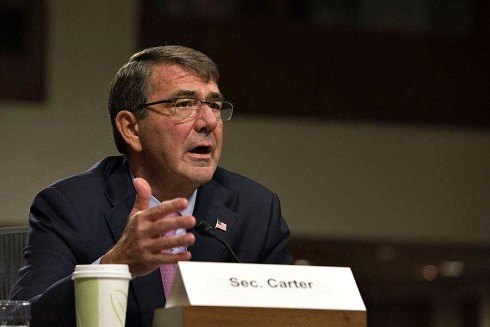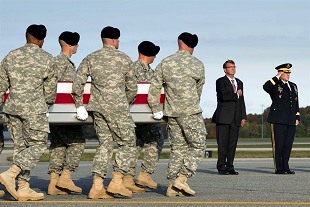[AUTHENTICITY CERTIFIED: Text version below transcribed directly from audio]
Chairman McCain: Welcome, the witnesses. Secretary Carter?
SecDef Carter: Thank you, Mr. Chairman, and Ranking Member Reed, Members of the Committee: Thanks for inviting us to come here today before you to discuss the counter-ISIL campaign in Iraq and Syria, and along the way to address some of the concerns, Mr. Chairman, that you -- you raised and to share with you, Senator Reed, some of the plans and initiatives that the Chairman [of the Joint Chiefs of Staff] and I are formulating for our campaign in both Iraq and Syria.
This is the first time for me appearing before this Committee alongside Chairman Joe Dunford, who was just in the region last week, as was noted. I’m grateful to Joe for answering my and the President’s call to step down from what every Marine knows is a higher position -- namely Commandant to the Marine Corps -- to become Chairman of the Joint Chiefs of Staff -- and to this Committee for confirming Joe. Thank you. I’m glad to have you here with me today.
Before I turn to the subject of today’s hearing, I want to reiterate -- as I’ve said consistently since March and continue to believe -- that Washington needs to come together behind a multi-year budget deal that supports our defense strategy, the troops and their families, and all elements of American’s national security and strength. I understand significant progress was made on this overnight and I'm looking forward to reviewing the details, but I welcome this major positive development and applaud the members of this Committee for what you’re doing to help us get there.
The Middle East presents a kaleidoscope of challenges, but there, as
everywhere, our actions and strong military posture are guided by
what’s in America’s interests.
That’s our North Star. And amid this
region’s complexity and uncertainty, those interests are to deter
aggression; to bolster the security of our friends and allies,
especially Israel; to ensure freedom of navigation in the Gulf; to
check Iran’s malign influence even as we monitor the implementation
of the
Joint Comprehensive Plan of Action; and, to degrade and
ultimately defeat
ISIL. This last one, ISIL, poses a threat to our
people and to friendly countries not only in the Middle East but
around the world.
Today, I will first outline the changes in the execution of our
strategy that we have considered, and are now pursuing militarily,
to gather battlefield momentum in the fight against ISIL. Then I'll address what Russia is doing in Syria, and why we won’t let it
interfere with our campaign against ISIL.
When
I last spoke to this committee about our counter-ISIL campaign
and its nine lines of essential military and non-military effort,1 I
made three things clear about the military aspects: first, that we
will deliver ISIL a lasting defeat; second, that truly lasting
success would require enabling capable, motivated local forces on
the ground, recognizing that this will take time and new diplomatic
energy; and third, that our strategy’s execution can and must and
will be strengthened.
All that's still true. Our determination is unchanged, even as
the situation continues to evolve, and we continue to adapt to
execute our campaign more effectively. And today I’d like to
elaborate on the third point and explain how we’re adapting our
campaign to do more -- reinforcing what we know works.

The changes we’re pursuing can be described what I -- by what I call the “three R’s” -- Raqqa, Ramadi, and Raids. Before I explain what they mean, let me also note that I took actions to streamline command-and-control of the counter-ISIL military campaign by assigning the -- the entire effort to a single general officer, Lieutenant General Sean MacFarland, where in the urgency of the early phase of the campaign last year several layers were added to the general officer already present in Iraq.
The first "R" is
Raqqa, ISIL’s stronghold and administrative
capital. We've been clear for some time that we need to keep up
pressure on Raqqa, and that to that end we will support moderate
Syrian forces fighting ISIL that have made territorial gains near
Raqqa. Indeed, some of them are within 30 miles of Raqqa today. The
"Syrian Arab Coalition", which we plan to strengthen through our new
equipping approach -- more on that in a moment -- will work over time
with other Syrian anti-ISIL forces to push towards Raqqa. To the
south, we plan to further strengthen our partner, Jordan. And from
the skies above, we expect to intensify our air campaign, including
with additional U.S. and coalition aircraft, to target ISIL with a
higher and heavier rate of strikes. This will include more strikes
against ISIL high-value targets as our intelligence improves; also
its oil enterprise, which is a critical pillar of ISIL’s financial
infrastructure. As I said last Friday, we’ve already begun to ramp
up these deliberate strikes.
Part of this pressure includes our new approach to the
Syria Train-and- Equip Program. I, like President Obama and members of this
committee, was
disappointed with that program’s results. We
accordingly examined the program this summer, and have since changed
it. I use the word "change" -- not "end" -- change the program.
While the old approach was to train and equip completely new forces
outside of Syria before sending them into the fight, the new
approach is to work with vetted leaders of groups that are already
fighting ISIL, and provide equipment and some training to them and
support their operations with airpower. This approach builds on
successes that local Syrian Arab and Syrian Kurdish forces have made
along Syria’s northern border to retake and hold ground from ISIL
with the help of U.S. airstrikes and equipment resupplies.
If done in concert as we intend, all these actions on the ground and
from the air should help shrink ISIL’s territory into a smaller and
smaller area and create new opportunities for targeting ISIL --
ultimately denying this evil movement any safe haven in its supposed
heartland.
The second “R” is
Ramadi, the capital of Iraq’s Anbar province,
which serves as a critical example of the Abadi government’s
commitment to work with local Sunni communities with our help to
retake and hold ground from ISIL and in turn to build momentum to
eventually go northward to Mosul.
Under
Prime Minister Abadi’s leadership, the Iraqis have begun to
use American-made F-16s to support counter-ISIL operations, and have
empowered capable battlefield commanders to step forward. As we see
more progress towards assembling capable and motivated Iraqi forces
under Baghdad’s control and including Sunni elements, we're willing
to continue to provide more enabling capabilities and fire support
to help them succeed. However, the Iraqi government and security
forces will have to take certain steps militarily to make sure our
progress sticks.
We need to see more in the direction of multi-sectarian governance
and defense leadership. For example, we’ve given the Iraqi
government two battalions’ worth of equipment for mobilizing Sunni
tribal forces; as we continue to provide this support, the Iraqi
government must ensure it is distributed effectively. If local Sunni
forces aren’t sufficiently equipped, regularly paid, and empowered
as co-equal members of the Iraqi Security Forces, ISIL’s defeats in
Anbar will only be temporary.
The third and final “R” is raids, signal -- signaling that we won’t hold back
from supporting capable partners in opportunistic attacks against ISIL, or conducting such missions directly, whether by strikes from
the air or direct action on the ground.
Last week’s rescue operation
was led by Iraqi Kurdish forces, with U.S. advisers in support. One
of those accompanying advisors,
Master Sergeant Joshua Wheeler,
heroically acted to ensure the overall success of the mission and
lost his life in the process.

At the same time, the raid on Abu Sayyaf’s home, the
strikes against Junaid Hussain
and most recently Sanafi al-Nasr, should all serve
notice to ISIL and other terrorist leaders that once we locate them,
no target is beyond our reach.
As we’ve looked at how to gather momentum and adapt to the changing
battlefield, some have discussed putting in a buffer zone, humanitarian
zone, or no-fly zone in Syria. We have analyzed various options and
the political and military requirements of each. These options are
complex and raise some challenges, which I'm prepared to discuss in
answer to your questions.
Let me now turn to Russia’s involvement in Syria. To be clear, we
are not cooperating with Russia, and we’re not letting Russia impact
the pace or scope of our campaign against ISIL in Iraq and Syria.
While we negotiated a document on safety of flight with the
Russian
Minister of Defense, we do not align ourselves more broadly with
their military actions, because instead of singularly attacking ISIL,
as they said they were going to do, they are primarily attacking the
Syrian opposition, as the Chairman has noted, which further fuels
the tragic civil war there. Their actions suggest a doubling-down on
their longstanding relationship with Assad -- sending advisers,
artillery, and aviation to enable and support the Assad regime and
Iranian forces in attacking moderates who oppose the regime and are
essential to Syria’s political transition. And it appears the vast
majority of their strikes -- by some estimates as high as 85 to 90
percent -- use
dumb bombs, which obviously increases the possibility
of civilian casualties.
So, as Russia acts in a coalition of two with Iran at its side, the
United States will continue to strengthen our 65-nation global
coalition. Even as we’ve reached an understanding with the Russians
on safety protocols for coalition pilots over Syria, we will keep
prosecuting our counter-ISIL campaign unabated. We will keep
supporting the moderate Syrian opposition, along with our other
commitments to friends and allies in the region. And, consistent
with our strong and balanced approach towards Russian aggression
elsewhere in the world, including NATO and Ukraine, we will keep the
door open for Russia to contribute to efforts toward a political
solution, in which -- which in the final answer -- analysis -- is the
only answer to the Syrian conflict.
I have discussed the military strategy and accompanying campaign,
but before I conclude, I remind the Committee that defeating ISIL
and protecting America requires coordinated efforts across all of
the so-called nine lines of effort -- to include supporting effective
governance in Iraq, enhancing intelligence collection, disrupting ISIL’s financing, countering ISIL’s messaging, stopping the flow of
foreign fighters, providing humanitarian support, and protecting our
homeland -- where other departments and agencies of our government
have the lead.
Thank you.
 Book/CDs by Michael E. Eidenmuller, Published by
McGraw-Hill (2008)
Book/CDs by Michael E. Eidenmuller, Published by
McGraw-Hill (2008)
1 The nine lines (quoted more or less verbatim from Carter's July 2015 testimony before the Senate Armed Services Committee): 1) building a more effective, inclusive, and multi-sectarian governance in Iraq (and to some extent Syria); 2) denying ISIL safe haven; 3) building partner capacity in Iraq and Syria; 4) enhancing intelligence collection on ISIL; 5) disrupting ISIL’s finances; 6) counter ISIL’s messaging; 7) disrupting the flow of foreign fighters to and from ISIL; 8) providing humanitarian support to those affected by the conflicts in Iraq and Syria; 9) disrupting terrorist threats (Source: http://www.defense.gov)
Images Source: defense.gov
Audio Source:
dvidshub.net
Audio Note: AR-XE = American Rhetoric Extreme Enhancement
Page Updated: 12/14/23
U.S. Copyright Status: Text, Audio, Image = Public domain.
